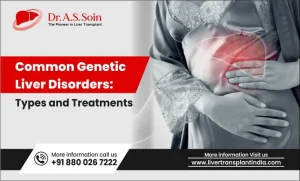Liver transplantation becomes necessary when individuals face irreversible liver failure. This includes adults suffering from conditions such as liver cirrhosis, liver cancer, or chronic liver diseases induced by hepatitis, which can progress to end-stage liver failure. Genetic factors can also lead to acute liver failure in children, necessitating urgent transplant intervention.
The majority of liver transplant recipients are individuals in the early stages of liver cancer. The Liver Transplant India team at Medanta Liver Institute, led by Dr. Soin, provides expert care and comprehensive treatment for a variety of liver-related disorders, including liver cancer and transplantation.
Table of Contents
ToggleWhen is a Liver Transplant Necessary?
Liver transplantation is typically considered when liver diseases progress to a critical stage, causing severe damage or dysfunction. Below are common conditions that may necessitate a liver transplant:
- Chronic Hepatitis with Cirrhosis: Untreated chronic hepatitis, particularly hepatitis B or C, can lead to cirrhosis, characterized by the formation of scar tissue that impairs liver function. Liver transplantation becomes an option when cirrhosis progresses to end-stage liver disease, resulting in complications like portal hypertension and liver failure.
- Primary Biliary Cirrhosis: An autoimmune disorder that damages the liver’s bile ducts, potentially leading to cirrhosis and liver failure over time. When medical treatments fail to manage advanced stages of the disease, transplantation may be necessary.
- Biliary Atresia: A congenital condition affecting bile ducts, often requiring pediatric liver transplants when corrective surgeries are ineffective in preventing liver damage.
- Chronic Alcoholism: Prolonged alcohol abuse can result in alcoholic liver disease, progressing to cirrhosis and necessitating transplantation when other treatments fail.
- Wilson’s Disease and Hemochromatosis: Rare genetic disorders causing copper or iron accumulation in the liver, leading to liver failure if untreated. Transplantation may be considered if these conditions advance despite medical therapy.
- Metabolic Disorders: Conditions affecting liver function due to metabolic abnormalities, requiring transplantation when medical management fails.
- Other Chronic Liver Disorders: Including autoimmune liver diseases and non-alcoholic fatty liver disease (NAFLD), which may progress to end-stage liver disease necessitating transplantation.
- Acute Liver Failure: Sudden and severe liver dysfunction, often requiring emergency transplantation in cases of acute liver failure due to toxins, drugs, or viral hepatitis.
- Liver Tumors: Liver transplantation may be an option for certain liver cancers like hepatoblastoma or hepatocellular carcinoma (HCC), particularly when tumors are localized and meet specific criteria.
Guidelines for Liver Transplantation
Medical professionals evaluate each patient individually to determine the suitability for liver transplantation based on their specific condition and prognosis. Common indications include:
- End-Stage Liver Disease: When the liver is severely damaged and unable to function adequately, often resulting in significant symptoms and a poor prognosis without transplantation.
- Irreversible Liver Damage: Conditions such as cirrhosis leading to complications like portal hypertension and hepatic encephalopathy may necessitate transplantation.
- Failure of Medical Management: When traditional therapies fail to control liver disease or its complications effectively, transplantation may be the last resort to improve survival and quality of life.
Liver transplantation represents a transformative treatment option for end-stage liver diseases, offering patients renewed hope and improved outcomes. It requires meticulous planning, expertise from a skilled surgical team, and lifelong post-transplant care.
The Liver Transplant India team at Medanta Liver Institute stands at the forefront of liver transplantation in India, providing advanced treatment and comprehensive care. Led by Dr. Soin and renowned for their success rates, they offer cutting-edge therapies for liver cancer and other liver-related conditions.
Advancements in medical technology continue to enhance the success and outcomes of liver transplantation, offering patients a brighter future. It’s crucial for individuals facing liver diseases, including cancer, to consult with healthcare experts to explore all treatment options, including transplantation, and make informed decisions about their health and well-being.








